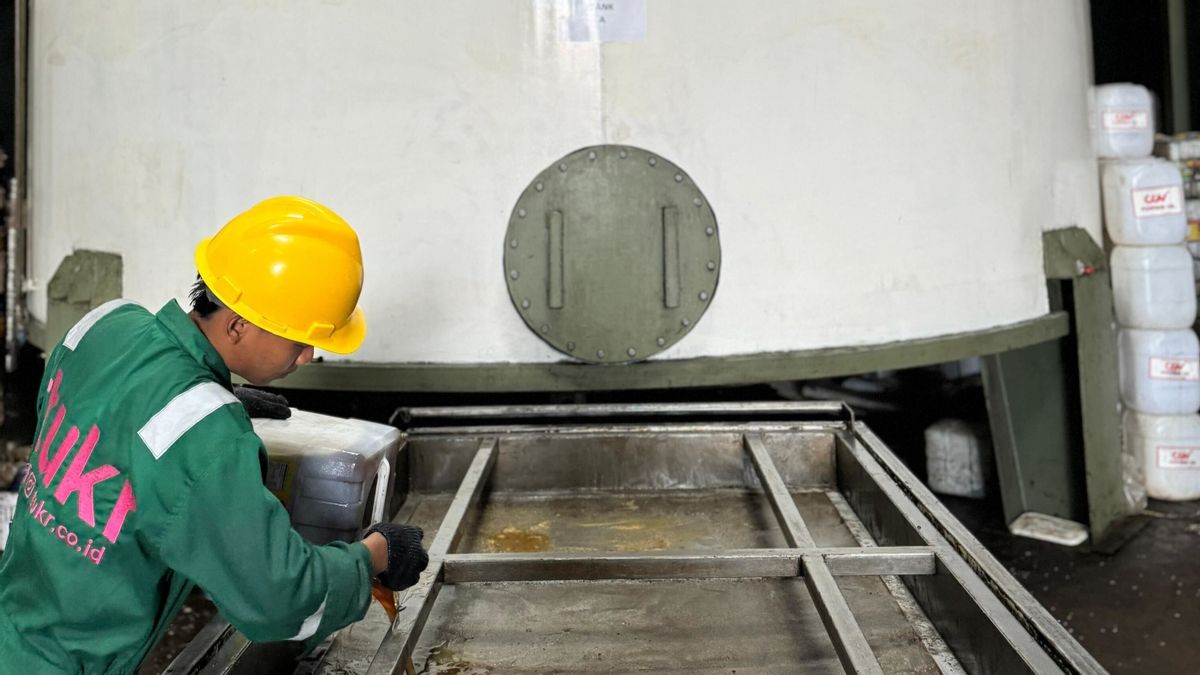JAKARTA - PT Chandra Asri Pacific Tbk (Chandra Asri Group), a leading provider of energy, chemical and infrastructure solutions in Southeast Asia, is proud to announce its long-term commitment to the renewable energy sector in Indonesia through collaboration with Biofront to invest in the procurement and collection of vegetable fuel raw materials (BBN). This strategic step will be carried out by utilizing Biofront's use cooking oil (UCO) or crude oil collection unit in Indonesia, TUKR.
TUKR (tukr.co.id) is one of the leading non-governmental oil-gathering companies in Indonesia that operates in all major cities in Indonesia. TUKR cooperates in managing crude oil produced from food production in restaurants, hotels, malls, and many more in a sustainable and responsible manner. This oil is then sent to bio refineries to produce environmentally friendly fuels, including sustainable aviation fuels (Sustainable Aviation Fuel/SAF).
The TUKR mission is to eliminate improper disposal of cooking oil waste, reduce global greenhouse emissions and support wider adoption of renewable fuels to substitute fossil fuels. TUKR handles the entire process, from oil collection to storage, processing, and final shipments of crude oil itself.
The partnership with Biofront, one of the world's largest collectors of waste-based raw materials, marks Chandra Asri Group's commitment to expanding its environmentally friendly business portfolio and the Company's Creating Shared Value (CSV) sustainability program. This collaboration highlights the Company's active involvement in circular economic initiatives while securing essential raw materials for potential bio refineries, which will support vegetable fuel production.
This investment is very important for Chandra Asri Group's strategic growth in the environmentally friendly fuel sector, especially through the production of biofuel and Bio-Nafta. This commitment is in line with the Government of Indonesia's efforts to promote renewable energy initiatives and increase energy sovereignty. This partnership is an important step in advancing Indonesia's goal of achieving Net Zero Emissions (NZE) in 2060, which further confirms the Company's commitment to support the national energy transition.
By investing in sustainable fuel assets and technology, Chandra Asri Group aims to become a leader in sustainable practices in industry and in Southeast Asia. This strategic step will strengthen the Company's position as a leader in the field of renewable energy and demonstrate the Company's dedication in facing the challenges of global climate change.
Chandra Asri Group has also successfully obtained the International Sustainability and Carbon Certification (ISCC), a globally recognized certification for environmentally responsible production. This certification confirms that the Chandra Asri Group facility has met the requirements to process vegetable raw materials into bio-based products, such as Bio-Propylene, Bio-Ethylene, Bio-Crude C4, and Bio-Pygas. This achievement reflects the Company's dedication to sustainable sources of raw materials, reduces carbon emissions, and supports closed-loops that minimize environmental impact.
Chandra Asri Group's investment in collecting raw materials through this partnership places the Company strategically to take advantage of the fast-growing market. This ensures a stable supply of raw materials for future vegetable fuel production, strengthens Chandra Asri Group's sustainability goals and strengthens its position in the renewable energy sector.
Director of Human Resources and Corporate Affairs Chandra Asri Group, Suryandi, said, the partnership with Biofront marks an important milestone in our commitment to sustainable growth. This collaboration is in line with Chandra Asri Group's strategy to diversify through environmentally friendly business initiatives, which strengthen the company's dedication to sustainability and environmental management.
"We see bio-based raw materials, such as Bio-Naphtha, as essential to facilitating industrial transitions to more environmentally friendly practices. The renewable Naphta generated from UCO offers practical solutions for industries that want to minimize their carbon footprint. In addition, this initiative plays an important role in promoting a circular economy by optimizing resource efficiency. We are also enthusiastic about exploring future collaboration in other sectors in the circular economy, such as used tires and plastic waste recycling," said Suryandi, in his statement, Monday, October 28.
Chief Executive Officer, Biofront Commodities, Fahad Farooq, stated that this partnership affirms the important relationship between collectors of raw materials and Bio-refinery in the green fuel sector, where access and security of raw materials is absolute. The presence of the regional and expertise of Chandra Asri Group in the field of chemistry and logistics provides Biofront the advantages in collecting, storing, and distribution of raw materials, as well as allows us to directly supply Chandra Asri Group with essential raw materials for bio-based production.
BACA JUGA:
"We are also committed to developing waste flows and alternative materials with Chandra Asri Group in Indonesia, including used tires and collecting plastic waste and production of pyrolysis oil, all aimed at reducing carbon emissions further through the use of abundant local waste but not optimally utilized", said Fahad.
UCO, known as the second generation raw material for biofuel refineries, is very important for producing Renewable Diesel (RD) and Sustainable Aviation Fuel (SAF). With the increasing global demand for RD and SAF due to increasingly stringent regulatory mandates, the need for reliable sources of raw materials is becoming increasingly important.
Recycling used tires and plastic waste begins with collecting these materials, followed by pyrolysis, a process that heats these materials inside oxygen-free reactors, converts them into valuable products such as pyrolysis oil, black carbon, and synthetic gases. Pirolysis oil can be refined into high demand products such as vegetable fuels, recycled nafta, and biochemicals for plastics and industrial applications.
Pirolysis oil can also be processed jointly at the nafta oil/cracker refinery to replace conventional fossil raw materials and meet market demand for sustainable energy and raw materials. With increasing support from industry and government for environmentally friendly solutions, demand for pyrolysis oil is expected to increase, making it an important method to reduce TPA waste and promote the circular economy. In addition, the Chandra Asri Group is currently developing pyrolysis oil at the Asari IPST waste processing facility in Cilegon.
The English, Chinese, Japanese, Arabic, and French versions are automatically generated by the AI. So there may still be inaccuracies in translating, please always see Indonesian as our main language. (system supported by DigitalSiber.id)















